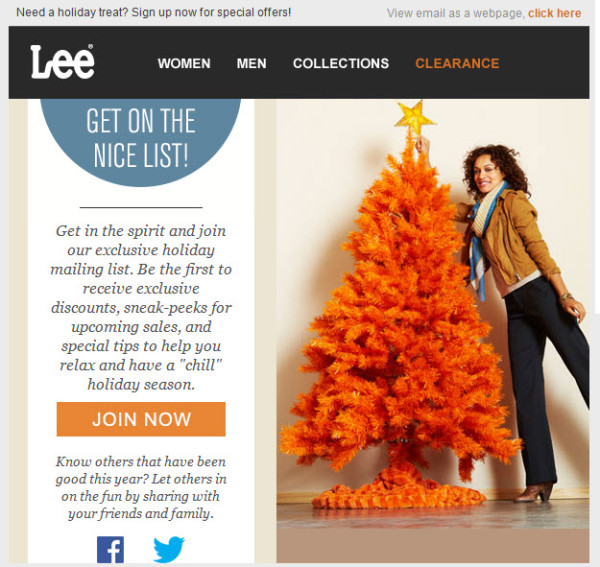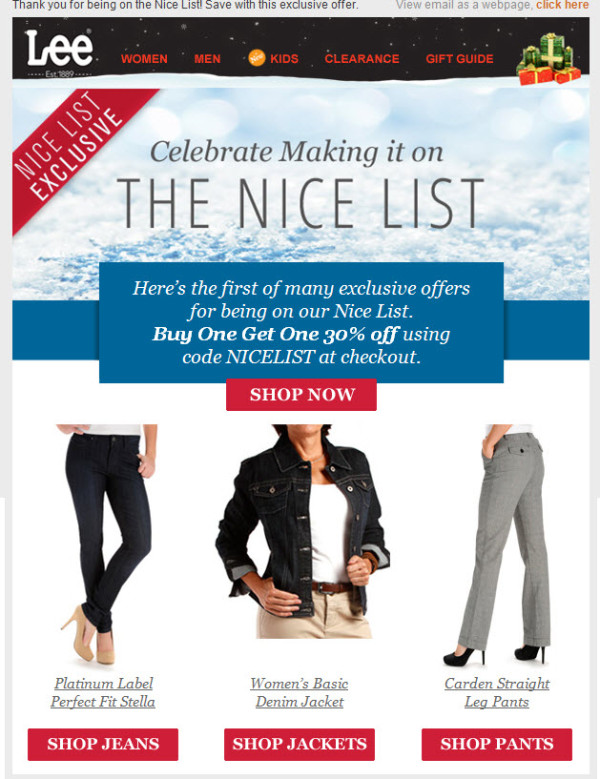Four Ways to Segment Email Subscribers for the Holidays
The last two months of the year bring an increase in email frequency as retailers try to drive revenue during the busiest shopping season of the year. To help you make the most of your opportunities, here are four ways to segment your email subscribers, optimize your email content, and avoid subscriber fatigue. 1. Your […]
The last two months of the year bring an increase in email frequency as retailers try to drive revenue during the busiest shopping season of the year. To help you make the most of your opportunities, here are four ways to segment your email subscribers, optimize your email content, and avoid subscriber fatigue.
1. Your Best Customers
Your best customers will make your best segment. In most cases, your best customers may make up less than 10 percent of your list. But if you are using a quintile method to segment, this is your top twenty percent.
You should reward your best customers for their loyalty. Over time, they’re your biggest spenders — and probably your brand champions, to boot. Here are some popular and effective ways to engage them commensurate to their “best customer” status:
Friends And Family
A number of brands send their friends and family offer to all of their email subscribers, but I’m not a fan of this tactic. I can understand it because having an email address for a customer or prospect is more of a relationship than none, but now that email lists have reached a higher volume, this campaign should be reserved for the best of the best. It’s a reward — a perk for your most loyal subscribers.
Extra Emails
Your best customers will also be open to receiving more emails, with permission. Invite subscribers to opt-in to a list specifically for additional offers via email. By sending additional emails to this group, you avoid over-mailing other subscribers and create repeat purchasers from a targeted group of subscribers.
Ideally, you would begin building this list earlier in the fall through stand-alone campaign requests, supporting promotional pods in other emails, Facebook posts, and similar tactics. The following is an example from Lee Jeans (disclosure: a client where I work, DEG).

Exclusive Offers
Your best subscribers deserve exclusivity. You can do this in combination with the ideas above, or use exclusive offers as a standalone tactic. By providing their email address, subscribers deserve to receive promotions that are not available to the general public.
Again, with the increase in list sizes, a top-tier level of exclusivity can be reserved for the best subscribers. Be sure to let them know in the communication that they are receiving an extra special offer because of their status. Following is an example of an exclusive campaign after opting in to the holiday-specific list featured above.

Early Access To Deals
If creating multiple offers is too complex for your ecommerce system or subscriber management model, then simply sending your email promotion to your best customers a day before the remainder of the subscriber list is an easy way to incentivize your best customers to pay you an early visit. This allows your best subscribers to take full advantage of inventory options while they’re still available.
2. Purchasers From Last Year
Another group of subscribers to target are those customers who purchased during the same holiday timeframe last year. This can be an especially good segment to target if these customers have not purchased since. Target these subscribers with content by price relative to what they spent last year, or by category, based on what they purchased last year.
If you have a behavioral intelligence engine (like iGoDigital, Certona, etc.), then simply create a dedicated campaign for these subscribers that includes content based on the product intelligence from these tools.
3. Purchasers From Two Years Ago
In addition to those that purchased last year, mine your subscriber list for customers who purchased two years ago during holiday, but not last year. This can be a great group to specifically retarget with a “We Miss You” campaign designed to reengage a dormant customer.
I wouldn’t stretch beyond this timeframe, however, because you run the risk of mailing a spamtrap. In fact, it would behoove you to only mail customers from more than a year ago if the subscribers have opened or clicked an email in the last 12 months. No one needs a deliverability issue, and especially not during the holidays.
4. New Subscribers
A final group to target during the holiday season is subscribers who have recently opted in but haven’t purchased yet. These new subscribers may have visited your site to browse for gift ideas and signed up for email as an initial relationship with your brand. They liked what they saw enough to begin a relationship, so they’re likely to be open to an offer as an introduction to your brand.
And if you play your cards right, fourth quarter presents an opportunity for a spike in the number of “recently signed up” subscribers if you are able to opt-in a healthy percentage of the seasonal increase in site visitors. So closely consider your value proposition, as well as your opt-in messaging and its positioning on your site for holiday.
Change your welcome email to a holiday theme. It’s the first email these subscribers receive, and these are subscribers who have a higher propensity to purchase than new subscribers during other times of the year. Make the most of your first impression and consider a welcome series, or promotional campaigns targeted at these new subscribers, to convert first-time purchasers you can cultivate over the New Year.
Inbox Overflow
During the holidays, it becomes increasingly difficult to stand out in the season’s crowded inboxes, but intelligently segmenting your messages so that you’re providing real, relevant value to your subscribers can give you an advantage.
Segmented emails have higher engagement and conversion rates, and while they’re important year-round, using a few of these holiday segmentation recommendations can make a big holiday difference.
Contributing authors are invited to create content for MarTech and are chosen for their expertise and contribution to the martech community. Our contributors work under the oversight of the editorial staff and contributions are checked for quality and relevance to our readers. The opinions they express are their own.
Related stories